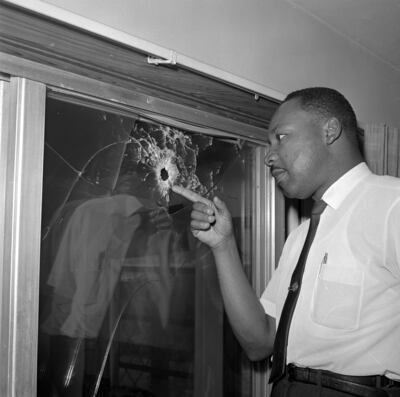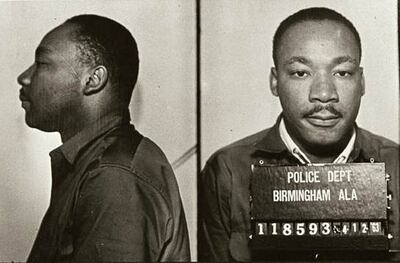As the US celebrates its long Martin Luther King Jr holiday weekend, #WeWantVotingRights is a top social media trend in the Land of the Free.
The recent battle for the Senate to end the filibuster and pass the Freedom to Vote Act and the John Lewis Voting Rights Advancement, and the decreasing likelihood that Democrats will be able to unite to curb Republican-led voter restrictions, comes as the nation celebrates a civil rights trailblazer whose work helped to bring about the 1965 Voting Rights Act.
It’s a moment not lost on Martin Luther King Jr’s own family, which is calling for no celebration of the holiday without the passage of voting rights legislation.
“It is right and correct that in the US we are using MLK’s national holiday to focus on voting,” said Nicole Austin-Hillery, executive director of the US programme at Human Rights Watch.
“He very clearly understood the intersectionality between voting and securing rights and justice in all other areas. So it is appropriate that this weekend Americans are being asked to understand that intersectionality, understand that if you are not ensuring free, fair and equitable access to the ballot box then you are undermining democracy.”

The world best knows Dr King for the lines of his “I Have a Dream” speech, delivered at the 1963 March on Washington for Jobs and Freedom. In that speech, he spoke of an anti-racist future in which “my four little children will one day live in a nation where they will not be judged by the colour of their skin but by the content of their character”. But Dr King’s activism encompassed far more than dreaming of hand-holding. He was a radical community organiser who trailblazed various progressive issues in the US and abroad.
Gallup polling in 1966 found 63 per cent of Americans had an unfavourable opinion of Dr King, a decline in popularity from the previous year, where 45 per cent held unfavourable opinions of him. The reverend was also under constant surveillance by the FBI over concerns that the civil rights leader known for his philosophy of non-violence was a threat to national security.
“That part of his history is not given its due attention, as much as the larger issues of him being a great humanitarian. It would do us well to re-acquaint ourselves with all he stood for,” Ms Austin-Hillery said.
Anti-poverty work and housing access

Dr King was deeply critical of the American economic model and an early activist against rising income inequality. In the weeks leading to his assassination, his work focused on organising a new march on Washington known as the Poor People’s Campaign, and in his final book, Where Do We Go From Here: Chaos or Community? Dr King laid out the case for a guaranteed income.
In a 1967 speech in Atlanta, Dr King asked: “‘Why are there 40 million poor people in America?’ And when you begin to ask that question, you are raising a question about the economic system, about a broader distribution of wealth.
“When you ask that question, you begin to question the capitalistic economy. And I’m simply saying that more and more, we’ve got to begin to ask questions about the whole society. We are called upon to help the discouraged beggars in life’s marketplace. But one day we must come to see that an edifice which produces beggars needs restructuring.”
Ms Austin-Hillery notes that Dr King’s work on poverty and economics was uniquely tied to issues of racism because of the legacy of slavery in the US.
“When we talk about problems in education, housing, the healthcare system, it is because those systems from their inception were built on thinking and mechanisms that were about oppression and were about benefitting the white, land-owning class that brought slaves to this country,” she said.
It is an area of Dr King’s activism and vision of racial justice that activists say is particularly, if not more, important in 2022.
“MLK didn’t get a chance to witness mass incarceration, he didn’t get a chance to witness ‘the war on drugs’, he didn’t get a chance to see all the other laws that came after him that discredited his work and made it harder for black and brown people to live,” said Kevin Cramer, a community organiser in Washington DC and founder of the black liberation activist group The Palm Collective.
“Redlining, redistricting, all of those things happened after him … the US government is still oppressing people.”
But Ms Austin-Hillery sees local-level progress in the US, pointing to reparation models in places such as Evanston, Illinois.
“[Evanston’s] done it by looking at how they can make changes to housing so that black communities that have been redlined out of their neighbourhood have opportunities for fair and adequate and equal housing,” she said. “I am encouraged by what I see happening because there is so much happening on the local and state level.”
The Vietnam War

Dr King was outspoken on his opposition to the US military industrial complex and the Vietnam War, which he characterised as putting Washington “against the self-determination of a vast-majority of the Vietnamese people and put [the US] in the position of protecting a corrupt regime that is stacked against the poor”.
Stanford University’s King Institute notes the civil rights leader publicly tempered his opposition to the war in its earliest years because “opposition to the war provoked criticism from members of Congress, the press and from his civil rights colleagues who argued that expanding his civil rights message to include foreign affairs would harm the black freedom struggle in America”.
But as the conflict in Vietnam progressed, he increasingly incorporated anti-war efforts into his activism. In his 1967 speech Beyond Vietnam, he connected the war to poverty at home.
“I knew that America would never invest the necessary funds or energies in rehabilitation of its poor so long as adventures like Vietnam continued to draw men and skills and money like some demonic, destructive suction tube. So I was increasingly compelled to see the war as an enemy of the poor and to attack it as such.”
For Mr Cramer, Dr King’s anti-war emphasis and philosophy of non-violence has informed the modern march towards justice and thinking beyond US borders.
“MLK’s legacy has influenced me in teaching me about intersectionality … to comprehend that to be in the fight for black people is also to defund the military, is also to advance education,” he said. “And when we’re thinking from such an inclusive space, it allows for genuinely authentic radical love, upward mobility, not just for black people, but for us all.”
'White moderates'

Dr King worked more closely with white activists and political figures than did his contemporaries such as the Black Panther Party’s Fred Hampton or activist and former Nation of Islam spokesman Malcolm X, but he voiced sharp critiques of white America’s ability to enact revolutionary change.
“I have almost reached the regrettable conclusion that the Negro’s great stumbling block in the stride towards justice is not the White Citizens Counsilor or the Ku Klux Klanner, but the white moderate who is more devoted to order than justice,” Dr King wrote in 1963 in the isolation of a Birmingham, Alabama jail.
In an interview with NBC in 1967, he said: “I think the vast majority of white Americans will go but so far. It’s a kind of instalment plan for equality. And they are always looking for an excuse but to go so far.”
For activists like Mr Cramer, this messaging translates to the modern rhetoric around Black Lives Matter and the fight against police brutality after the police killings of George Floyd and Breonna Taylor, among others.
“His legacy has been whitewashed and garnered to gaslight black people … The content of Breonna Taylor’s character didn’t matter [when police shot and killed her]. Not just her, but all the other people who have been murdered by the police,” Mr Cramer said.
“The civil rights movement sparked because Emmett Till was murdered, that was the catalyst. And black boys are still dying, and now racist politicians can quote [Dr King’s] ‘I Have a Dream,’ but I think he would be turning in his grave.”










